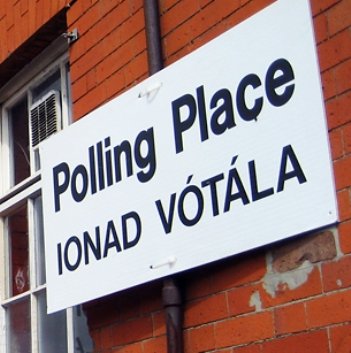Marriage Equality for Emigrants
The referendum for Marriage Equality is not something that I ever thought I’d ever actually miss. When I left Ireland there were other things which I was more concerned about missing out on; SuperQuinn sausages, Curly Wurlys, my Mammy etc. Having said that, all of those things pale in comparison to a referendum which would help make Ireland a truly better place to live, making it an actual home for many of its citizens.

As I write this I sit in the staff room of Oka Highschool, in Mie Prefecture of the glorious archipelago Empire of Japan. Like hundreds of thousands of Irish around the world I am very far from home. In a moment like this, a moment where I will be unable to participate in steering Ireland toward becoming a more inclusive home for all its citizens, I feel that distance all the more acutely.
If I was home I would be voting YES. As someone who identifies as straight, the issue of equality, or rather inequality, and its expression through discrimination is a secondary one to me seen as I have never experienced the kind of aforementioned discrimination personally. Regardless of that fact, or perhaps because of it, and because I have been made aware of this discrimination by my friends and by accounts of the LGBT community, I believe it’s my responsibility to listen, to act accordingly, and to help rectify the situation as best I can to help those who are in need. Oisin Mckenna has written an excellent and very personal account detailing how altering the status of marriage would have far reaching effects outside of the institution itself and how it would help to disrupt the tacit and internalized homophobia which exists in Ireland today. I highly recommend it to all.
To clarify for all those currently living abroad, and also those living at home who aren’t in the known, your voting rights are set out in the 1963 Electoral Act, specifically under Section 5 (4) of the Electoral Act 1963 which states:
“a person shall be deemed not to have given up ordinary residence if he intends to resume residence within eighteen months after giving it up…”
[pullquote] “Ireland is one of only three EU states that do not provide their citizens living abroad with an overseas vote. [/pullquote]
You have the right to vote as long as you intend to return to Ireland as your place of residence within eighteen months of your departure. What the Act fails to reconcile, however, is that the means to vote is not provided to citizens living abroad. In other words, if you wish to vote you have to travel home to do so. Effectively this denies many individuals, myself included, the ability to vote in the approaching referendum. For those of us Irish who are living abroad who find ourselves in this situation (having been living outside of Ireland for less than eighteen months and having the intention to return), the Irish Government has not established any structure (postal vote, voting at an embassy) to allow such individuals to do so.
 Ireland is one of only three EU states that do not provide their citizens living abroad with an overseas vote. This seems somewhat perplexing given Ireland’s long and storied history of emigration throughout the world. This fact is made all the more galling when one remembers The Gathering of 2013, where the Irish Government readily attempted to utilise the Irish diaspora to stimulate trade and economic growth. Useful perhaps in terms of giving back to the homeland, the lack of an overseas voting infrastructure betrays the Government’s shallow regard for Irish citizens living abroad and their disregard for their input into the governing of the country. In a letter to the Irish Times Grace Hughes articulately sets out her discontent over her, and others of the expatriate community, inability to vote in the upcoming referendum. We’re Coming Back is a campaign which has been set up to deal with this exact issue. It seeks to establish and legitimise the voice of the Irish diaspora by supporting campaigns like Get the Boat 2 Vote, which seeks to empower emigrants’ political agency in the referendum on May 22nd.
Ireland is one of only three EU states that do not provide their citizens living abroad with an overseas vote. This seems somewhat perplexing given Ireland’s long and storied history of emigration throughout the world. This fact is made all the more galling when one remembers The Gathering of 2013, where the Irish Government readily attempted to utilise the Irish diaspora to stimulate trade and economic growth. Useful perhaps in terms of giving back to the homeland, the lack of an overseas voting infrastructure betrays the Government’s shallow regard for Irish citizens living abroad and their disregard for their input into the governing of the country. In a letter to the Irish Times Grace Hughes articulately sets out her discontent over her, and others of the expatriate community, inability to vote in the upcoming referendum. We’re Coming Back is a campaign which has been set up to deal with this exact issue. It seeks to establish and legitimise the voice of the Irish diaspora by supporting campaigns like Get the Boat 2 Vote, which seeks to empower emigrants’ political agency in the referendum on May 22nd.
Not all émigrés have been able to escape the curse of overcast skies and for those who live abroad, but who are still in the relative vicinity, making the pilgrimage back home for the 22nd of May might well be an option. Get the Boat 2 Vote has been set up to assist emigrants who wish to return home from the UK to have their say in the referendum. On the webpage you can find details concerning various methods of how you can travel home via ferry, train, car, unicycle or plane. In an open letter to Ryanair, the organisers behind Get the Boat 2 Vote have called for the airline to help facilitate emigrants in their journey home by offering discount fares. To date Ryanair have not responded.
If you, like myself, are not in a position to get the boat and you won’t be able to vote on the 22nd of May, the question still remains; how can I help? The simplest and easiest solution, it would seem, is to help raise awareness. I will admit that this article is an attempt to try and do just that; it is an attempt to assuage my somewhat guilty feelings about not being able to vote in the referendum. There are various sites which allow you to set up a twibbon like “Straight up for equality” and “Yes Equality 2015” onto your Facebook profiler but let’s be honest; the chances are that the majority of your friends on Facebook are like minded individuals and while useful, I’d imagine that twibbons and shares on social media alike are limited in their usefulness. Least we all forget #kony2012.
The Vote With Us campaign is built around a series of videos where people explain why they’ll be voting Yes on May 22nd. You can find all the information you need to participate here. Campaigns like this are useful in that they help to establish a steady dialogue around a Yes vote, which hopefully convinces others, who are perhaps unsure, that a Yes vote is what is truly best for Ireland. A particularly prominent video doing the rounds of the social media circuit was made by Brighid and Paddy, a couple who, on first appearance, wouldn’t strike anyone as quintessential advocates for the rights of the LGBT community, a fact which has helped their message to spread. The video and the positive reaction surrounding it highlights the commonly held belief that it is the older generations of Irish citizens who are more likely to possess conservative social values that may oppose the planned constitutional amendment.
[pullquote] “Having these types of conversations can be difficult, because often you’re outright challenging people’s long held beliefs. [/pullquote]
TCDSU has set up a campaign to try and tackle this issue directly. #Ringyourgranny is aimed at trying to cultivate dialogue between different generations with the hopes of disseminating the message of equality. The idea is fairly self-explanatory; they want you to ring your granny, or any grandparent, or parent, auntie, uncle, brother, sister etc. and ask them if they will be voting Yes on the 22nd of May. This will start conversations about marriage equality where people who are entirely convinced or unsure can sound out the reasons behind their thinking. In the above video, which depicts members of TCDSU calling their family members, it’s refreshing to see a certain level of awkwardness. On the whole the callers are received with support but some conversations aren’t that straight forward; people want to talk it out and convey opinions which aren’t in line with the promotion of equality. Having these types of conversations can be difficult, because often you’re outright challenging people’s long held beliefs. Nonetheless, these conversations are essential; imagining the incomparable “awkwardness” of being told that you can’t get married in Ireland helps to establish that. The video helps to promote the fact that these are the conversations that need to be happening and that the best way to promote equality is to talk openly about.
There are many, many campaigns now in the swing of campaigning for a Yes vote. Thankfully, the internet allows you to support a lot of their virtual content even if you are a great distance from home. Sites like Yes Equality accept monetary donations, which are obviously essential to running and maintaining a campaign. A significant contributor to why many people have left Ireland is because of their own monetary prospects, but if you are in a position to donate it is another way that you can help the cause, and so I’d ask everyone to consider it.
Hopefully there is something here which is of use to you, whether you’re sipping gin in foggy London town or drinking cans under the Golden Gate Bridge. If you’re not able to vote, but you want the results of the upcoming referendum to be a resounding Yes for equality, the only way to ensure this is to help in whatever way you can; so spread the message of equality and start conversations, even if those conversations are via Skype or Viber.
Photo: Daniel Blok
